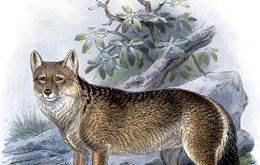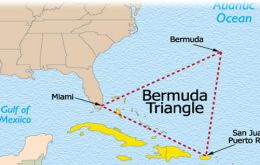MercoPress. South Atlantic News Agency
Health & Science
-
Saturday, August 14th 2010 - 08:03 UTC
Remains of extinct Falklands’ wolf, 'Warrah', discovered by 13-year old

A natural history enthusiast since he was just three, now aged13, Dale Evans a native Falkland Islander has made a remarkable and significant scientific discovery.
-
Saturday, August 14th 2010 - 03:02 UTC
Crate of Shackleton’s Antarctic-hut whiskey shows liquor did not freeze

A crate of Scotch whiskey that once belonged to famous polar explorer Ernest Shackleton was opened Friday, several months after having been rescued from a 100-plus old prison of Antarctic ice.
-
Friday, August 13th 2010 - 06:51 UTC
Grant to expand water services in Uruguayan rural communities and schools

The Inter-American Development Bank approved a 6.85 million USD grant to expand access to better sanitation and water services in Uruguayan rural communities and schools.
-
Wednesday, August 11th 2010 - 06:39 UTC
Two scientists allege to have solved “The Bermuda Triangle” mystery

According to two research scientists the mystery of vanished ships and airplanes in the region dubbed “The Bermuda Triangle” has been solved. No need to appeal to outer space aliens, time anomalies, submerged giant Atlantis pyramids and bizarre meteorological phenomena ... the “Triangle” simply suffers from an acute case of gas.
-
Tuesday, August 10th 2010 - 03:19 UTC
“Human race must look to outer space or it will become extinct”

The human race must look to outer space within the next century or it will become extinct, Professor Stephen Hawking has warned, according to an article published by the Daily Telegraph credited to Richard Alleyne, Science Correspondent.
-
Thursday, August 5th 2010 - 21:10 UTC
South American countries gather to discuss reducing broad band costs

The economic development of Latin America has pushed technology experts to seek out a stronger technological network to suit the region’s changing needs.
-
Wednesday, August 4th 2010 - 20:59 UTC
Meat from offspring of cloned cows consumed in UK triggers controversy

Meat from the offspring of a cloned cow was eaten in the UK last year, the Food Standards Agency has said. Two bulls from the embryos of a cow cloned in the US were bought by a farm near Nairn in the Highlands, and meat from one was sold to consumers.
-
Wednesday, August 4th 2010 - 06:55 UTC
North of Chile, land of telescopes, preparing to promote “astronomy tourism”

With the installation of the world's biggest telescope planned in northern Chile many communities there are hoping the tourism industry will benefit from the world of astronomy.
-
Saturday, July 31st 2010 - 19:10 UTC
Chile first South American country with cities Google Earth 3D

Internet users all over the globe will soon be able to better understand what cities like Santiago and Valparaíso look like. Chile is set to become the first South American country to have buildings in some of its cities rendered in 3-D through Google Earth.
-
Thursday, July 29th 2010 - 05:43 UTC
UN General Assembly declare access to clean water a human right

Safe and clean drinking water and sanitation is a human right essential to the full enjoyment of life and all other human rights, the General Assembly declared Wednesday, voicing deep concern that almost 900 million people worldwide do not have access to clean water.